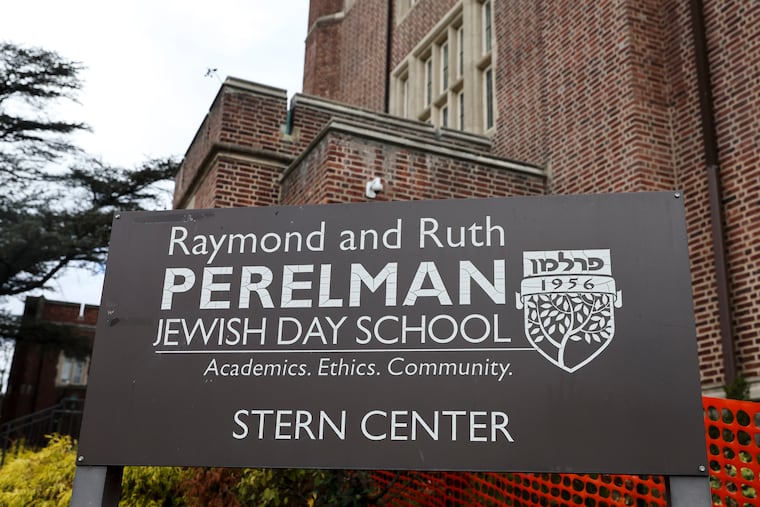Israeli children come to Philly-area Jewish school to wait out the war back home
The Perelman Jewish Day School has already enrolled nine students from Israel, and anticipates up to 10 more arrivals in the coming weeks.

Marc Ufberg and his 8-year-old son, Matan, were hiking in the Golan Heights on Oct. 7 when news reached them that Hamas had attacked southern Israel.
As they drove home to Herzliya, a coastal city north of Tel Aviv, they saw military reservists putting on uniforms in gas station parking lots. Flatbed trucks carrying tanks rushed south on the highways. Within days, as schools closed across the country and missile warning sirens blared in the city, Ufberg would make the difficult choice to send his son back to his birthplace in the United States to stay with his family in the Philadelphia area.
“Matan is a super happy kid,” Ufberg said, “and I don’t want him to see this.”
Matan is now one of nine Israeli children who have been relocated to the Philadelphia region and enrolled at Raymond and Ruth Perelman Jewish Day School, a private K-5 school with campuses in Wynnewood and Elkins Park. School administrators said 10 additional Israeli students are en route or in the process of enrolling within the coming weeks, joining about 300 existing students in both schools.
The Israel-Hamas war has already displaced more than 250,000 Israelis and 1.4 million Palestinians living in the Gaza Strip. Life in the southern reaches of Israel where Hamas invaded on Oct. 7 has been upended the most, but some are fleeing from the north, too, as conflict flares with Hezbollah near the Lebanon border and schools remain closed or are on limited schedules across much of the country.
Mitchell Daar, the head of school at Perelman, said school leaders opened their doors as soon as they heard that Israeli children were landing in the region. Tuition is being temporarily waived for those students, Daar said, as it remains unclear how long they will remain enrolled.
“This is about the Jewish values that we espouse every day,” Daar said. “Part of our mission is global citizenship, being part of a global Jewish community, an enduring bond and a keen sense of responsibility for the state of Israel.”
Perelman could not disclose what regions the students came from in Israel, but Daar said that “every family and every situation is unique.” Some are relocating with both parents. Others, such as Matan, are staying with relatives, as both of his parents remain in Israel for work.
President Joe Biden’s administration admits few Palestinian refugees to the United States each year, and there is no indication that will change now. But the United States is relaxing travel restrictions to admit more Israelis seeking refuge, while some dual citizens have already fled the country amid what many expect to be a long and brutal war as Israel begins a ground incursion into the Gaza Strip.
Herzliya has not been evacuated. But Ufberg, who grew up in Scranton and relocated to Israel when Matan was 2, said relocating his son to family in Montgomery County made sense for his education. His brother’s children already attend Perelman, and his sister-in-law works there.
And Matan is thriving so far. He’s signed up for basketball and karate, and is enjoying spending time with his favorite cousins: “He just said, ‘Abba, I’ll see you in a year,’” Ufberg said. “It’s night and day compared to what kids are going through” in Israel.
For Perelman, Daar said the Israeli newcomers also enrich the educational experience, which includes daily Hebrew study as well as lessons on Jewish Scripture, history, and cultural life. Bringing in bilingual, native Hebrew speakers who can go back and forth between languages has already been a “wonderful” addition to the cultural exchange, he said.
The war itself is now part of that dialogue, too.
Daar said teachers discuss the Israel-Hamas war in “age-appropriate” ways, and the school employs a psychologist and offers educational resources for parents. For some, those conversations also begin at home.
Ufberg said Matan has bubbled with questions as he tries to understand the dizzyingly complex conflict that has uprooted his life. One night, the two sat down for a Middle Eastern geography lesson. On a piece of blank paper, Ufberg drew Israel, the West Bank, Gaza, and then Lebanon, Syria, and Egypt, while also outlining the history of Israel since 1947.
He stressed to Matan how lucky their family was compared with others. He stressed how lucky Israel was to have an extensive network of bomb shelters, advanced missile detection systems, and the Iron Dome to intercept rockets.
Every day now, he sees reminders that he made the right decision by sending Matan to the United States. On a recent phone call, he told his son that five rockets had been aimed at Herzliya that day, but no one was hurt. Then Matan asked a question that stunned him.
“Abba, do they have bomb shelters in Gaza?” he asked. Ufberg said no.
“So it’s just luck if you survive?” his son asked.
Ufberg was devastated. There was no easy answer. But there was also no escaping the reality of war, even if his son was thousands of miles from the conflict.
“It just sucks to explain this to him,” he said.